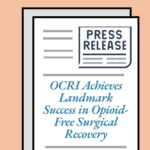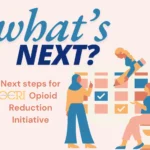How OrthoCarolina uses Epic to reduce opioid prescriptions during and after surgery
Epic is an Electronic Health Records (EHR) systems used worldwide, and by OrthoCarolina, a large privately-owned orthopedic practice based in Charlotte, NC. When faced with the question of how their patients would be able to not only learn about opioid minimizing options, but notify their healthcare team of their interest in reducing opioid prescriptions in their care, Epic’s patient interface called “MyChart” was a great solution.
OrthoCarolina team’s Epic build consisted of three goals:
- Introduce patients to their opioid minimizing options via MyChart in hopes it raises their awareness of the pitfalls of opioids and their options to avoid the highly addictive medication.
- Allow patients to notify their healthcare team about their desire to reduce the amount of opioids prescribed as it relates to their care using MyChart
- Notify healthcare practitioners with a BPA (BestPractice Advisory) notification in the patient’s chart regarding the patient’s wish to pursue opioid minimizing pain treatment
What patients see in MyChart
1. All OrthoCarolina patients received this alert in their MyChart apps when our initiative launched practice-wide providing them with information about opioids and their role in surgical treatment.

The text reads:
Are you interested in minimizing opioid use during and after surgery?
Your doctors may be able to treat your pain without narcotics. Learn more and opt in here.
2. That green LEARN MORE button takes patients to this page next:
After reviewing the below information, patients will have the opportunity to determine if they would like to notify their healthcare team of their interest in exploring opioid-minimizing alternatives in their treatment plan.
If a patient “opts in,” an alert will appear in their EPIC Storyboard and a pop-up will appear in EPIC whenever a practitioner attempts to prescribe an opioid medication encouraging them to discuss alternative options with the patient.

Which reads:
“Opioids are highly addictive and leave patients groggy after surgery. The OrthoCarolina Research Institute (OCRI) successfully tested a new approach to managing pain that doesn’t require the use of opioids during or after surgery. In this first-of-its-kind, trailblazing study, OCRI found opioid-free surgery can be a safe and effective treatment option for some orthopedic patients.
To learn more about our research and your options CLICK HERE.
As a possible surgical patient, are you interested in potentially reducing opioids prescribed during your care? By selecting “yes” we will notify your healthcare team of your interest in minimizing opioids and using non-opioid alternative medications.”
3. If a patient selects “No”, that’s where their journey with opioid minimizing surgery likely ends.
What healthcare professionals see in a patient’s chart
4. Selecting “Yes” will trigger a series of notifications to appear in the patient’s medical charts, only seen by their healthcare practitioner at OrthoCarolina.

5. A Patient Chart Advisor will automatically appear in their chart informing their team that they have Opted In and are interested in opioid minimizing pain management alternatives during and after their surgery.

6. Should that patient’s healthcare practitioner attempt to order opioid prescriptions for this patient, they will get this Critical BPA (Best Practice Advisories) alert, reminding them of the patient’s wishes to minimize opioid use.

From this page, the practitioner can remove the opioid prescription order or dismiss it based on what they have discussed with the patient and believe to be best for that particular patient’s case.
To read a full list of medications used during OCRI’s opioid free surgery study, CLICK HERE.
DISCLAIMER: The medications listed in that document may or may not apply to your surgery. The medications listed there are ones that were used as part of an opioid free surgery research study, and the exact medications and dosages used for each patient varied depending on the type of surgery that was conducted. The list is not intended to be an all-encompassing list of potential medications that can be used for reducing opioids in your treatment. It is nothing more than an example or guideline of potential opioid-reducing options. That list is not medical advice.

 Back to Press
Back to Press
